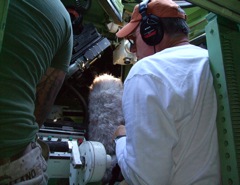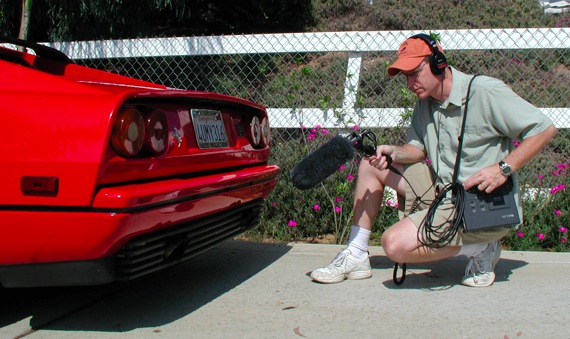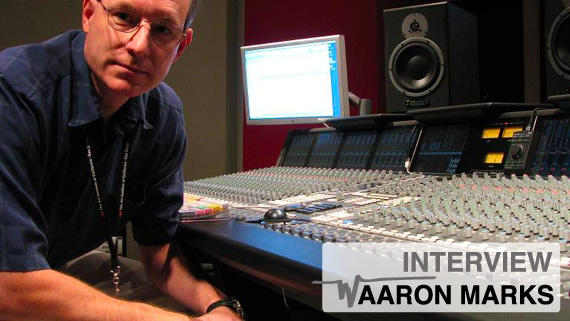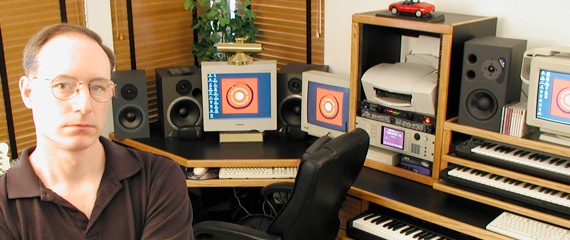Here is an interview with our special guest Aaron Marks, talking about general aspects of his career. Hope you like it!
Designing Sound: Tell us about your career and how you got started with sound.
Aaron Marks: Career? You mean this is like …a job?!? Well, I never thought of it that way but yeah, I guess it’s a living. If you had to put a label on me, I’d say I’m a composer, sound designer, field recordist, voice over artist and author. My focus, as you know, is creating audio for games through my company, On Your Mark Music Productions, but I have done some film work and am always open to other opportunities. I’m also on staff in the audio production department at The Art Institute of California – San Diego, currently teaching the art of field recording. My ‘career’ has definitely had some variety but I love the mixture which I think is what keeps me creative and fresh.
I became interested in all-things audio during my teenage years. I played guitar and eventually bought a 4-track recorder to dabble in songwriting. Because of that, I pursued audio engineering as a ‘must-have’ skill while I continued my musical endeavors, also learning to play drums, keyboard and bass guitar along the way.
As we all know, music is an expensive hobby. It actually took an ultimatum from my wife to either “make money and have my hobby support itself or to stop buying gear!” So, not wanting to miss out on any cool new toys, I got organized, decided how I was going to do it and ran full steam into the unknown. I started off scoring local public service announcements, radio spots, music libraries, whatever I could find that paid – with eventual sights on television and film. Along the way, though, I bumped into a neighbor who had just started his own game development company and the next thing you know I’m doing music and sound effects for their first game!
Sound design was a new concept to me back then but I love sound effects and recording. And since creating sound effects wasn’t really any different to me than creating instrument samples and patches, I relished the new challenge and suddenly found a new calling!
DS: Did you have a mentor or specific source of learning that helped you along career path
AM: For the most part, I’ve been relatively self-taught. I did have a guitar teacher for a few months, took a couple semesters of recording arts at the local community college, have various friends and colleagues who have been willing to share their knowledge over the years, but other than that, it’s basically been trial and error and years of doing it the hard way first. That has its obvious disadvantages, of course, but I’ve found the advantages to how I started far outweighs a formal education and allows for a unique perspective as I approach each new project.
For example, I spent the first 5 years of my sound design career creating sounds on a 2 channel audio editing program. ‘Non-destructive’ editing hadn’t made it’s way on the scene quiet yet so every time I layered or changed a sound I was working on, I had to either save the new version each time or keep my fingers crossed that the changes I made were acceptable. It hit me like a ton of bricks when a friend showed me a sound design project he was working on using a multi-track program. That was one of those moments I can put my finger on that made an immediate difference to the way I do business – but because I’d done it so long the other way, I think my ear was more tuned to what each new layer or step did to a sound, so now I didn’t have to spend so much time experimenting and could do what I heard in my head quickly.
I also never owned a sound library until a few years into my sound design career and I think that was the best thing I could have ever done to learn the art. From the very beginning, I created every sound from scratch, either generating elements or recording sounds myself. Talk about stretching your mind and really pushing yourself to think, think, think! It’s so easy to grab a sound you need from a library but in the end, it really doesn’t allow you to go through the mental process, to experiment, to maybe find a sound no one has ever heard before. I think starting with the initial building blocks, creating your sounds from scratch and encouraging creativity is the key to being good at sound design. Not everything sounds like you would expect and learning that you don’t have to actually break someone’s arm to get a good bone snapping sound is an important part of the process.
DS: What was your first gig like?
AM: My first sound design project was actually the very first game I ever worked on. I was initially hired to compose the music but since I was the ‘guy with the microphone’ the developer tasked me with sound effects and recording voice overs as well. And to add to the pressure, one of the actors was an established film actor with well over 25 major films to his credit. So there I was, minimal sound design experience, in charge of creating all of the games audio and an incredible character actor attached to the project – I definitely had to ‘step up’!
I think I was very lucky to have a developer who was willing to work with me as well as allow me total creative freedom. They set me up with an early copy of Sound Forge and left the rest up to me, so it was definitely trial by fire. I had to learn a new program, figure out how to be creative with it and keep everyone happy which was quite a challenge since I was responsible for 1/3 of the project. I really think my musical and engineering background helped. After all, sound effects are just really small songs, right?
“I, of the Enemy” was a space strategy game with several cinematic tie-ins between levels. Not only was I creating sound effects but now I was also synchronizing them into the mini-movies and doing post production as well. The good news was every weapon, vehicle and alien creature were entirely fictitious so they could sound like anything. The bad news was that people already have pre-conceived ideas of what space ships, lasers and explosions sound like so I sort of had to be true to their expectations. Not having any sound libraries was a bit of a limitation, but it’s surprising what kind of space sounds you can make with vacuum cleaners, hair dryers, lawn mowers and power tools. I manipulated, layered and tweaked for months and in the end was very happy with how everything turned out. I became very excited about sound design after that project and now I’d say 75% of my business is field recording and sound design. Not bad for a ‘composer’!
DS: What do you love about being a sound designer?
AM: I’m a big fan of ‘sound’ and always seem to be actively listening to everything around me almost nonstop. There are some really cool sounds out there in the world and because I’m always creating, I’m always looking for something unique. Of course, this is a good and bad thing. Because I am always listening so intently, I need a big box fan to generate white noise so I can sleep at night! But during the day, though, it’s game on!
I think what I love most is being able to take a game character or an object or a scene and breathe life into it. It doesn’t matter how amazing the artwork, animations or cinematography are, they don’t come alive until the sound is added and that’s when the magic happens. The creativity involved is definitely what keeps me coming back and having an unlimited palette of sounds, tools and ideas really makes it rewarding!
DS: Where and how do you find you are most creative? Is there any technique or method you implement for that?
AM: A looming deadline or a really fat paycheck are two great motivators, of course, but aside from those obvious things, I find I’m the most creative when I feel like part of the team and am able to take ownership of my creative duties. We’ve all had projects where you’re under someone’s thumb and having to please them specifically, I think, takes away from what the project needs. Being trusted and allowed to do ‘my thing’ unencumbered really unleashes my creative juices and that’s when I find myself working at my best.
Over the years, especially having a musical background, waiting for inspiration isn’t an option in a work for hire situation. You’ve got to be able to turn the faucet on instantly, work at your best and do justice to the project – and I’ve learned to do exactly that. But, in a perfect world and left to my devices, I’m usually the most creative during the late morning and then again late afternoon until about midnight. Knowing that, I try to plan my day around those times to take full advantage of my muse.

DS: What would be the best advice you’d give sound designers both young and experienced?
AM: I see an interesting phenomenon in the academic world that is having a real impact on creativity. In order to teach concepts and ideas, students are exposed to rules and techniques which serve a specific purpose, but I think really gives them the wrong impression about creating and recording audio. It’s all well and good they have the ability to use the tools correctly but this can really be limiting. Once you get the basics down, I think it’s essential to throw all of the rules out the window and allow yourself total creative freedom. As an example, just because you’ve always used a specific microphone on the snare drum, who’s to say you couldn’t get an even better, fresher, more unique sound by using something else totally out of the ordinary? By not limiting yourself with ‘rules’, you’re opening yourself up to some incredible possibilities – so don’t be bogged down by them.
Another pearl of wisdom would be to always keep your ears AND your mind open and actively listen to the world around you. I’m not saying that so nobody gets any sleep like me, but by always listening, you don’t have to waste a lot of time looking for that perfect sound because you’ve already heard it somewhere before and you remember where to find it. I really think that active listening helps my sound design, even when I’m just using libraries. Paying attention to the various elements that can make up a sound give you a real advantage when you have to create them from scratch. And when you’re in a time crunch, that can make all of the difference in the quality of your sounds.
My best advice would be to encourage everyone to do what you have to do to stay enthusiastic, creative and working. We all get tired and burned out – so schedule time away from your work and do something completely different. When I’m feeling the grind, I don’t go anywhere near my studio, even if it’s just for one day. When I do finally head back in there and fire up the computers, I’m ready to roll. I usually feel recharged and reinvigorated and that makes being creative a whole lot easier! As long as you keep an eye out for those creative lulls and get away even for an hour, you’re allowing yourself to relax and unwind – and that can be incredibly important for creative people. I remember times where I’ve stared blankly at a slot machine symbol animation playing over and over and over again and not ‘hearing’ anything. That’s when I walk away completely and stop forcing it. Within a half hour or so, an idea usually just hits me. So, time away is a good thing.
Of course, we all have to work and finding the secret to ensuring we can make a career out of it is probably the most important part of what we do. Do outstanding work, always give them more than what they ask for, make their job easier, be professional, treat everyone with respect – all key ingredients to a lifelong career. Make sure you do what you have to do to keep working – something that can be easily forgotten when you get so focused on creating sounds!
DS: In addition to your sound design work, you’re also a music composer. Where do these disciplines intersect? What are the pros and cons of having both a music and sound design perspective?
AM: From my perspective, I can’t even see being a sound designer without having a music background! Apart from all the really cool sounds musical instruments can provide for sound effects creation, having a musical ear is a definite plus. One of the essentials to effective sound design is the ability to layer and manipulate various elements to create a workable sound effect. Sound design often takes on a ‘musical’ quality and the construction of sound effects, at least in the way that makes most sense to me, follows the same path as recording a song would. I treat sound effects as mini ‘songs’ most of the time, selecting a tempo or pacing, a note or key which I sometimes either match to the background music or purposefully make it out of key for a different impact. By having sensitivity to what the music might be doing, it allows me to create sound effects that complement the rest of the audio. Of course, there are times when being a composer isn’t an advantage at all but it certainly doesn’t hurt.
I think good sound effects should make some sort of emotional connection with the listener – just like really good music does. As a composer, I’m always looking for that emotional angle and it tends to spill over into my sound design as well. Whether you’re creating sounds for pure, guttural entertainment or just adding a touch of realism to a scene, there is an opportunity to really make it shine. Any skill you can bring to the table, whether it’s being a composer, an engineer, a field recordist or sound designer, will make you that much more able to do a fantastic job and ‘wow’ the audience.
DS: What are your favorite tools to work with? What would be your “secret weapon” to use in the studio or in the field?
AM: Most of the time, my favorite tool is whatever gets the job done, but I do seem to have some things I use more than others. I’m still an avid user of Sound Forge 4.5 – the batch converter is just too perfect, plus the CPU doesn’t even know that version of the program is running. That’s not to say I use it every time but on audio that doesn’t have to be super high resolution, like for iPhone games or audio streamed to a cellphone, it’s perfect.
For field recording, the Neumann RSM191 stereo shotgun is my ‘go to’ mic for most of what I gather. There is just something about the sound of that mic that resonates with me over other mics out there. It’s not perfect for every occasion but I’ve had great luck with everything from tanks and vehicles to weapons and general Foley – so I like to start with it unless there is a compelling reason not to.
My other favorite tool is, believe it or not, my ears – I depend on them every day and they’ve yet to let me down. That’s not to say my ears are any better than anyone else’s, but I’ve learned to use them correctly, to actively listen and not just pay attention to what I’m recording or creating, but to noises in the background or how each sound element is working together, for example. Just this week, I was out in the field with a team recording weapons. My task was to gather all of the non-firing sounds; dry firing, magazines inserted and ejected, slide and bolt action, etc. Once I found the sweet spot and had my levels set, my ears shifted to what was happening in the background. Was there an airplane flying overhead? Was there wind noise? Where there foot shuffles or clothes rustling? Because I knew the sound was being captured OK, I wanted to make sure the takes were clean, since we weren’t going to have the ability to run back out and try it again if they weren’t. So, out of all of my ‘tool’s, my ears are definitely my most treasured instrument!

DS: What are your favorite sounds to record/design?
AM: I like recording pretty much anything, but there are some things because of the experience involved that makes it a bit more fun. Exotic cars, military vehicles, weapons and aircraft are by far my favorite things to point a microphone at – not just because of the sounds they make but having the excuse to hang around and play with some neat toys is a big plus. The M1A1 Abrams tank we recorded for Operation Flashpoint: Dragon Rising was one of those memorable moments as well as the numerous Ferrari’s, hotrods and other exotic cars I’ve done over the years – each one was a treat! I also really enjoy capturing those ‘difficult to plan for’ sounds like thunder claps or a pack of yelping coyotes. There’s something about having a recorder going in the right place at the right time that makes this job pretty neat sometimes.
As far as sound design, that’s a tough one. I love creating sci-fi sounds, explosions and weapon shots but I think my favorites are the stuff I do for video casino games. I’ve been providing audio for casino games for over 15 years now and it’s still a lot of fun for me. The variety of themes keeps things fresh and the sounds are mostly happy and fun – it’s all about winning and keeping the excitement level up and it’s definitely been one of those jobs that I’ve thoroughly enjoyed! It’s also been great working with some very creative and talented animators and programmers, and keeping up with them is always an enjoyable challenge.
DS: Why did you decide to write a book about game audio? Is there a third edition coming?
AM: One of my ‘life’s goals’ was to write a book and have it published. Of course, my intention was to write a best-selling novel but the game audio opportunity presented itself and I jumped at it! Early on in my game career, I had been writing for Gamasutra.com, Game Developer Magazine and Music4Games as a way to organize my thoughts and share the findings. I found out quickly that it was also a great way to market myself and get my name out there to potential clients. Before long, I had enough material for a head start on a book and a publisher actually approached me with the idea. While I was considering the undertaking, my editor at Gamasutra connected me to his company’s book publishing arm which gave me a good comparison. They were also very interested and I ultimately took the best deal and company who I thought would best promote the book – so, The Complete Guide to Game Audio was born. After CMP Books was bought out by Focal Press, they quickly approached me for a 2nd edition and that’s where we are today. The book has had some pretty good success and I’m very happy with that. As for a 3rd edition, the publisher is very supportive and I’m pretty confident that when the time comes, there’ll be an updated version indeed.
Not many people know that I’m also the lead author of another game audio, Game Audio Development, which is part of Jeannie Novak’s Game Development Essentials series. This book was written to complement my first book with minimal overlap and a more academic approach to the subject. It’s used in many game audio courses and very popular in that field.
DS: What’s next for Aaron Marks?
AM: I have a general ‘direction’ I tend to pursue but I’m always open to other opportunities. Looking back, I started playing guitar to be in a band and wandered into songwriting. Songwriting lead to recording, engineering and producing in order to work out my ideas. I found I really enjoyed being creative behind the scenes and wasn’t really ‘stage’ material so that lead me to composing. Composing for games brought me to sound design (which naturally progressed to field recording), voice overs and being an author. Book writing opened the door to speaking, lecturing and teaching. Who can really say where it will go from here.
I enjoy being my own boss and contracting my services but, who knows, I could end up working in house somewhere in the next couple of years, depending on if the offer is right. I know I’ll be working on more game projects, one will have a large variety of military aircraft in it, and there is a possibility of a new book which I’m discussing with my publisher. I’ve always got my eyes and ears open and ready for the next challenge, whatever and wherever it might be!


Great interview with a great guy. It’s wonderful to see Aaron still succeeding!
I teach a Course on Game Audio and use Aaron’s book. He is a great author, and really understands how to put things in a context that amateurs and enthusiasts a like can understand.
Great article!
I really like the comment he made about learning the rules then using your own creativity to make things work. I see students and beginners always ad-hearing to specific rules instead of exploring new ways to record things. You always have to have fun with it and try new things. Another good article.
Thanks guys, I appreciate it!!